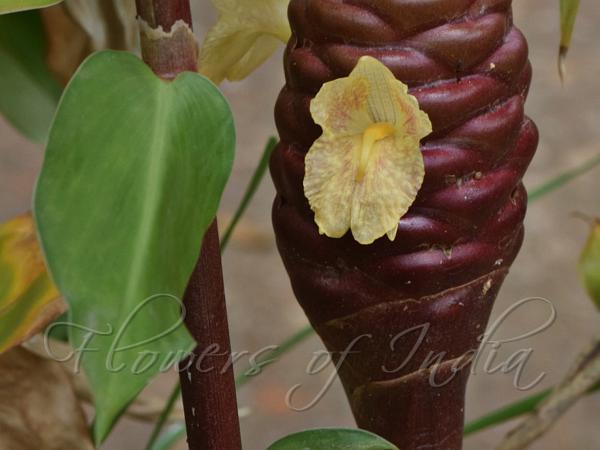|
| Malaysian Ginger |
|

|

|
|
|
|
Photo: |
Botanical name: Zingiber ottensii Family: Zingiberaceae (Ginger family)
Malaysian Ginger is a rhizome forming herb 1-1.9 m
tall, forming clumps with 3-10 leaf shoots per each clump. Leafy shoots
are slightly arching, composed of 18-25 leaves, base swollen 1.5-2.3
cm diam.; bladeless sheaths 5-6, up to 60 cm long. Leaf sheaths are
green to purplish-green tinge. Leaf-stalk is reduced to a light green
pulvinus, (3-4 mm long). Leaf blade is elliptic, 36-43 x 6-7.5 cm,
above green and hairless, below light green, base blunt, tip narrowed.
Inflorescence arises directly from the rhizome, 27-45 cm long, with 2-3
flowers opening at a time. Flower-cluster-stalk is close to the leafy
shoot, radical, erect, 25-29 x 1.2-1.3 cm, covered by 9-12 sheathing
bracts, tubular, 4-4.5 x 2.5-4 cm, externally dull red, greenish-red
towards the tip. Flower-spikes are ellipsoid to obloid-ellipsoid, 12-15
x 4.5-4.8 cm; bracts enclosing single flower, obovate, 3.6-3.8 x
3.0-3.2 cm, dull red to greenish-red tinge toward tip when flowering
and turning bright red after flowering, velvet-hairy, internally white,
hairless, tip flat. Bracteoles are narrowly ovate, 3.2-3.5 x 1.2-1.5
cm, translucent white with reddish tip. Flowers protrude from the
bracts, 6.3-6.5 cm long; sepal-cup tubular, 20-22 x 7-8 mm, translucent
white. Flower tube is 4.0-4.2 cm long, widening gradually towards tip,
white with pale yellowish towards the apical part, hairless; dorsal
petal narrowly ovate, 21-22 x 7-8 mm, pale yellowish, tip pointed;
lateral petals narrowly ovate, 20-21 x 5-6 mm, pale yellowish, lip
obovate-round, 2.4-2.6 x 1.8-2.0 cm, pale yellow, margins undulating,
tip rounded with a short cleft; lateral staminodes obovate, 17-18 x 8-9
mm, connective to the lip by basal 1/2, pale yellow with faint
red-brownish markings, tip rounded. Stamens are 24-25 mm long; filament
stalkless. Style is up to 6.5 cm long (straightened), white, hairless.
Capsule is oblong, 1.5 cm long, red. Malaysian Ginger is native to S.
Myanmar to W. Malesia.
Medicinal uses: In Malay traditional medicine,
midwives commonly make the poultice from leaves and rhizomes of
Malaysian Ginger before applying it to the body of the confinements
women for postpartum care. Leaves are also used as the poultice for
lumbago. In Thai traditional medicine, Malaysian Ginger rhizomes are
used to treat gastrointestinal diseases (peptic ulcers and
stomachache), constipation, myalgia, sprain, bruising/contusion, and
wounds. Moreover, essential oil from Malaysian Ginger rhizomes has been
used as a topical agent for Thai traditional massage.
In Malay traditional medicine,
midwives commonly make the poultice from leaves and rhizomes of
Malaysian Ginger before applying it to the body of the confinements
women for postpartum care. Leaves are also used as the poultice for
lumbago. In Thai traditional medicine, Malaysian Ginger rhizomes are
used to treat gastrointestinal diseases (peptic ulcers and
stomachache), constipation, myalgia, sprain, bruising/contusion, and
wounds. Moreover, essential oil from Malaysian Ginger rhizomes has been
used as a topical agent for Thai traditional massage.
Medicinal uses:
 In Malay traditional medicine,
midwives commonly make the poultice from leaves and rhizomes of
Malaysian Ginger before applying it to the body of the confinements
women for postpartum care. Leaves are also used as the poultice for
lumbago. In Thai traditional medicine, Malaysian Ginger rhizomes are
used to treat gastrointestinal diseases (peptic ulcers and
stomachache), constipation, myalgia, sprain, bruising/contusion, and
wounds. Moreover, essential oil from Malaysian Ginger rhizomes has been
used as a topical agent for Thai traditional massage.
In Malay traditional medicine,
midwives commonly make the poultice from leaves and rhizomes of
Malaysian Ginger before applying it to the body of the confinements
women for postpartum care. Leaves are also used as the poultice for
lumbago. In Thai traditional medicine, Malaysian Ginger rhizomes are
used to treat gastrointestinal diseases (peptic ulcers and
stomachache), constipation, myalgia, sprain, bruising/contusion, and
wounds. Moreover, essential oil from Malaysian Ginger rhizomes has been
used as a topical agent for Thai traditional massage. | Identification credit: Ashutosh Sharma, M. Sabu | Photographed in cultivation at TDU (FRLHT) Campus, Bengaluru. |
• Is this flower misidentified? If yes,